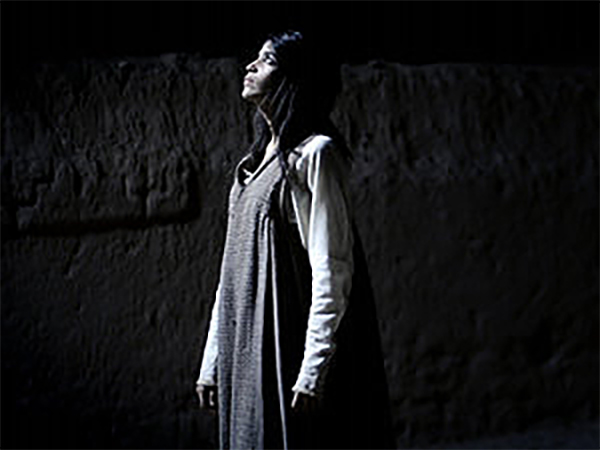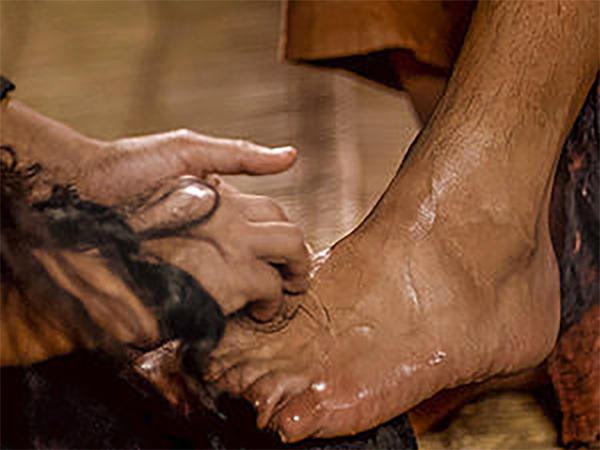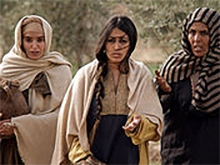"The devil's in the details!"
Yes, I know that folk proverb is often true. However, there are many more times that success or even hidden treasures are in those very details. When we are looking at Paul's letters in the New Testament, the beginning and ending of those letters often have treasures waiting to be discovered if we will pause and take a look at the details. This is especially true when we look at Romans chapter 16.
Paul had never visited Rome, yet he addressed 16 men and 11 women — Phoebe, Prisca, Mary, Junia, Tryphena, Tryphosa, Persis, Rufus' mother, Julia, Nereus' sister, and Olympas — and several households at the close of his letter to the church in Rome.*1 That Paul mentions so many people in a town he had never visited reminds us of the mobile nature of the early church, the commitment of believers to seek each other out in cities other than their home city, and Paul's prayer life which addressed his concerns for churches and the people who made up those churches. Paul's list of people whom he addressed in Rome is also a powerful reminder of the importance of women in the life of the early church. This reminder will conclude our little series on the value of women to God and to his people in the Bible.
Romans chapter 16 begins with a letter of recommendation for Phoebe to the church in Rome:
I commend to you our sister Phoebe, who is a deacon in the church in Cenchrea. Welcome her in the Lord as one who is worthy of honor among God's people. Help her in whatever she needs, for she has been helpful to many, and especially to me (Romans 16:1-2 NLT).There is some debate over whether or not Phoebe was a deacon or "just" a regular servant in the church at Cenchrea. Nevertheless, several insights are important to notice as we look at her importance to the churches in Cenchrea and Rome.
First, there was really no such word as deacon*2 — the word means "servant" and would probably best be translated "servant" everywhere it is found in the New Testament. We know if the term "servant" is intended for "just a regular servant of the church" or whether that "servant" was recognized as a "servant" to the congregation by the context and the way the person's role is described.
Second, by all counts, the language used for Phoebe connects her to a role with the congregation — "a servant of the church at Cenchrae" (Romans 1:1 ESV). The way the church in Rome is commanded by Paul to "help her in whatever she may need (require) from you..." (Romans 1:2 ESV) also supports this understanding. (If Phoebe's name had been Philip, there would be no doubt about the role as a recognized servant in the role described here.)
Third, that there are qualifications for "the women"*3 who serve in the role of "servant" listed in 1 Timothy 3:11 seems to suggest this role was recognized in Ephesus as well as Cenchrae and Rome, and supported by the apostle Paul.
 However, one decides on the issue of whether Phoebe was a "deacon" or "servant" recognized as serving the congregation, there are two truths that cannot be doubted:
However, one decides on the issue of whether Phoebe was a "deacon" or "servant" recognized as serving the congregation, there are two truths that cannot be doubted:
- Phoebe was invaluable to Paul and the congregations with whom she was involved.
- Phoebe served congregations and her service was not in an out-of-the-way or backseat ministry without any authority over the help she provided churches: in fact, the congregations in Rome were to help her do her ministry.
The next woman on the list is Prisca (or Priscilla) who was married to Aquila — they are always found together in the New Testament:
Give my greetings to Priscilla and Aquila, my co-workers in the ministry of Christ Jesus. In fact, they once risked their lives for me. I am thankful to them, and so are all the Gentile churches. Also give my greetings to the church that meets in their home (Romans 16:3-5 NLT).
This dynamic duo of a married couple hosted house churches in Rome (Romans 16:5), Ephesus (1 Corinthians 16:19), and Corinth (Acts 18:3). When the dynamic orator Apollos spoke about Jesus to unbelieving Jews, he spoke eloquently, but incompletely. Prisca and Aquila took him aside privately and helped him know the truth of Jesus more accurately (Acts 18:26).
Both Prisca and Aquila worked hard with Paul in the work of the gospel (with the technical term "co-workers" Romans 16:3). They had risked their lives right alongside Paul to share the gospel. Prisca played a huge role in evangelism, providing a place for the church to meet, and teaching Apollos the truth about Jesus. That her name was often mentioned first was not traditional practice in culture or in biblical literature and may suggest that she took the lead in these activities with her husband. That she partnered in ministry in conjunction with her husband Aquila does not negate her importance to the life of the church in three key cities of the ancient world — Rome, Ephesus, and Corinth.
While we don't have time to go over all the rest of the women named in Romans 16, I want to encourage you to read the list of names in several translations and get a feel for how important the work, service, ministry, support, and encouragement of these women were to Paul and the church in Rome and along the northern Mediterranean cities. Here are the verses in one translation with their key work or achievement in bold print and their names are underlined:
Greet my dear friend Epenetus. He was the first person from the province of Asia to become a follower of Christ. Give my greetings to Mary, who has worked so hard for your benefit. Greet Andronicus and Junia, my fellow Jews, who were in prison with me. They are highly respected among the apostles and became followers of Christ before I did. Greet Ampliatus, my dear friend in the Lord. Greet Urbanus, our co-worker in Christ, and my dear friend Stachys.
Greet Apelles, a good man whom Christ approves. And give my greetings to the believers from the household of Aristobulus. Greet Herodion, my fellow Jew. Greet the Lord's people from the household of Narcissus. Give my greetings to Tryphena and Tryphosa, the Lord's workers, and to dear Persis, who has worked so hard for the Lord. Greet Rufus, whom the Lord picked out to be his very own; and also his dear mother, who has been a mother to me.
Give my greetings to Asyncritus, Phlegon, Hermes, Patrobas, Hermas, and the brothers and sisters* who meet with them. Give my greetings to Philologus, Julia, Nereus and his sister, and to Olympas and all the believers who meet with them. Greet each other in Christian love. All the churches of Christ send you their greetings (Romans 16:5-16 NLT).
Paul's emphasis on the importance of these women is all the more remarkable when we realize that he lived in a culture that did not value the public role of women. Paul himself came from a Jewish world where women did not play a public role in religious life and a trained rabbi like himself would take great pains not to be seen in public talking with a woman (John 4:7-9; John 4:27).
So as we look back on the New Testament era and talk about the role of women in the church, we must be careful not to let the prohibition statements about women remaining silent (1 Corinthians 14:34; 1 Timothy 2:11-12) negate the things we know women did with Paul's blessing and support or negate what women did in the book of Acts. In other words, the prohibitions must be interpreted in light of what we know Paul supported, endorsed, and affirmed about women and their work for the Kingdom of God.
Were the prohibitions based on specific problems in those specific churches (Corinth and Ephesus)?
Did the prohibitions pertain to just specific issues that we don't quite understand — since the directive about silence for women in 1 Corinthians 14 is in the context of the abuse of spiritual gifts in assembly, yet Paul allowed women to pray and prophesy with their heads covered in 1 Corinthians 11?
 Were these prohibitions universal declarations applicable to all churches in all times, or just to those specific situations — since women prophesied in other places in the New Testament as in the situation with Philip's daughters and Prisca taught Apollos privately in the presence of her husband?
Were these prohibitions universal declarations applicable to all churches in all times, or just to those specific situations — since women prophesied in other places in the New Testament as in the situation with Philip's daughters and Prisca taught Apollos privately in the presence of her husband?
As we have seen in previous weeks, God created both men and women in his divine image and created each with intrinsic value as a bearer of his likeness. Both of equal value and preciousness to God. They were made to be complements of one another, each having certain gifts the other does not have. While the long fall away from God by humanity (described in Genesis chapters 1-11) ripped apart God's plan for both man and woman, Jesus brought fresh grace to the importance of women. We see him value, defend, praise, affirm, and acknowledge women at almost all their roles in his work.
Women were instrumental in supporting the ministry of Jesus and stood by him when the men fled. The earliest proclaimers and emissaries of Jesus after his resurrection were women — Mary Magdalene and the women at the tomb. These women, along with Mary the mother of Jesus, stood by Jesus through the Passion, resurrection, and were with the apostles at Pentecost praying for the coming of the Spirit with power.
At Pentecost, Jesus poured out the Spirit and promised that the last days prophecies of the Old Testament were coming true in that moment. Peter proclaimed that God's original plan of creation was being restored in a new way of life in Jesus and empowered by the Holy Spirit. Both men and women were to prophesy. Paul emphasized that anyone in Christ was a new creation: a new identity had begun as they were joined in baptism with Christ Jesus. Being a part of this new creation community of the Kingdom of God, meant that the old barriers that divided people fell away as Jew and Gentile, slave and free, as well as male and female became one in Christ Jesus.
In Philippi, and really all over Macedonia, prominent women came to Jesus. In Paul's travels we met Lydia who provided a place for the church to meet and the missionaries to stay. Later, Euodia and Syntyche who were threatening to split the Philippian church because of their disagreement. Their importance in the church, as well as their disagreement's threat to harm the church, came from their work with Paul in working hard to evangelize the Philippians and bring them to Christ. Paul equates these women and their work with his other co-workers who participated in the work of sharing the gospel with unbelievers.
There were women prophets in the early church and this was seen as fulfillment of Old Testament prophecy. Paul described this role as speaking "to people for their strengthening, encouraging and comfort."*4 These women seem to have stepped into roles that Jesus suggested when he affirmed Mary sitting at his feet learning as an apprentice Rabbi. He not only allowed this "scandalous" activity while Martha worked at the traditional and appropriate hostess role, he affirmed that Mary had made the best choice and it wouldn't be taken from her.
Women helped straighten out powerful preachers who did not completely know about Jesus — as Prisca did along with Aquila teaching Apollos.
Many, as today's list in Romans 16 indicates, worked hard for the Lord and his people. We don't know what that work entailed, but we do know that Paul felt it significant enough to include in his letter to the Romans.
 Some women, like Phoebe, were a great help to Paul's ministry and to the work of several churches. Their work was important enough not only for Paul to mention, but to also ask the house churches in Rome to help her in whatever she asked of them.
Some women, like Phoebe, were a great help to Paul's ministry and to the work of several churches. Their work was important enough not only for Paul to mention, but to also ask the house churches in Rome to help her in whatever she asked of them.
Bottom line, women played invaluable parts in Jesus' unfolding story of grace in his ministry and the life of the early church. More than second-class citizens as they have sometimes been described, they were front line participants in the proclamation of the gospel, in sharing a word of prophecy, in practicing hospitality, providing needed resources, and leading important ministry. To do less with women in our churches, and to value them less in our own estimation or relegate them to less in our churches today is to violate the example of Jesus in his ministry and to ignore the example of the early church.
*1 While a name or two is debatable by gender, most would agree with something close to this count.
*2 The word in Greek is diakonos and it refers to a simple table servant or household servant. The word always carries the connotation of servant wherever it is found. Early English translators did not translate the word servant, but transliterated it — they gave a sound equivalent instead an equivalent term in English. Since some of the first servants in the early church were appointed to take care of feeding the neglected widows in Jerusalem (Acts 6:1-7), the term appears to have gained an important distinction for those who serve those in need in some special way. By the time Paul wrote 1 Timothy 3 and Titus 1, the sense of a recognized servant to the congregation had a clear importance and responsibility and thus there was a certain character needed to serve in this role. Paul refers specifically to these kinds of recognized servants to the congregation in Philippians 1:1 along with the overseers (bishops).
*3 As the footnote of nearly every responsible Bible will suggest, the translation of "the women" as "their wives" in 1 Timothy 3:11 is an interpretation because the word wife is not used. The literal wording is "women likewise..." Since there are no corresponding character attributes given for the "the women" who are married to elders, then for there to be such for the men who are "servants" to the congregation seems out of place and the most logical conclusion for many conservative scholars is that these are character attributes for women who serve as servants to the church much like Paul gives for widows who serve the church in 1 Timothy 5:3-16 — these women were also supported by the congregation.
*4 The following Scriptures are shared on this paragraph summary because these passages are often overlooked or ignored. The other paragraphs are summaries of previous posts in this series. Below are links to these previous posts.
This is the sixth in a series of posts about how God values a woman and The Creator's plan for the people in Jesus' church to restore the Father's original intent through their life together.
In the first post — "Of Sacred Value" — we looked at God's creation of man and woman, both made in his image and both made of equal value.
In the second post — "Made to be Complements" — we saw how God created the male and the female to be complements of each other: each supplying what the other could not have without the other.
In the third post — "Restoring the Creator's Intent" — we focused upon the birth of the church in Acts chapter 2 and how the key elements of faith in Jesus, baptism, and the work of the indwelling Holy Spirit, God began re-creating a new humanity in the church. This new humanity valued men and women of equal importance as children of God, restoring the Creator's original intention through the life of the church in Jesus' disciples.
In the fourth post, we looked at Paul's language of inheritance and the radical declaration that men and women are not only equally heirs of God's promise, but also "Co-heirs with Christ of God's inheritance.
In the fifth post, we looked at the story of Martha and Mary where Martha worried about preparations and Mary sat at the feet of Jesus, the position of a student in training to be a Rabbi. How do we miss all the implications and Jesus' powerful words, probably because the story is "Too Familiar to Feel the Bite."
In the sixth post — The Women — we were reminded that while all of the male apostles forsook Jesus and fled with Peter denying the Lord and Judas betraying the Lord, a group Luke calls "the women" watched the crucifixion, saw where Jesus was buried, went to anoint the body of Jesus, saw the resurrected Lord first, and were sent to tell the other disciples that Jesus was raised from the dead.
Special thanks to Free Bible Images for the images used on this page.










Reader Comments
Archived Facebook Comments